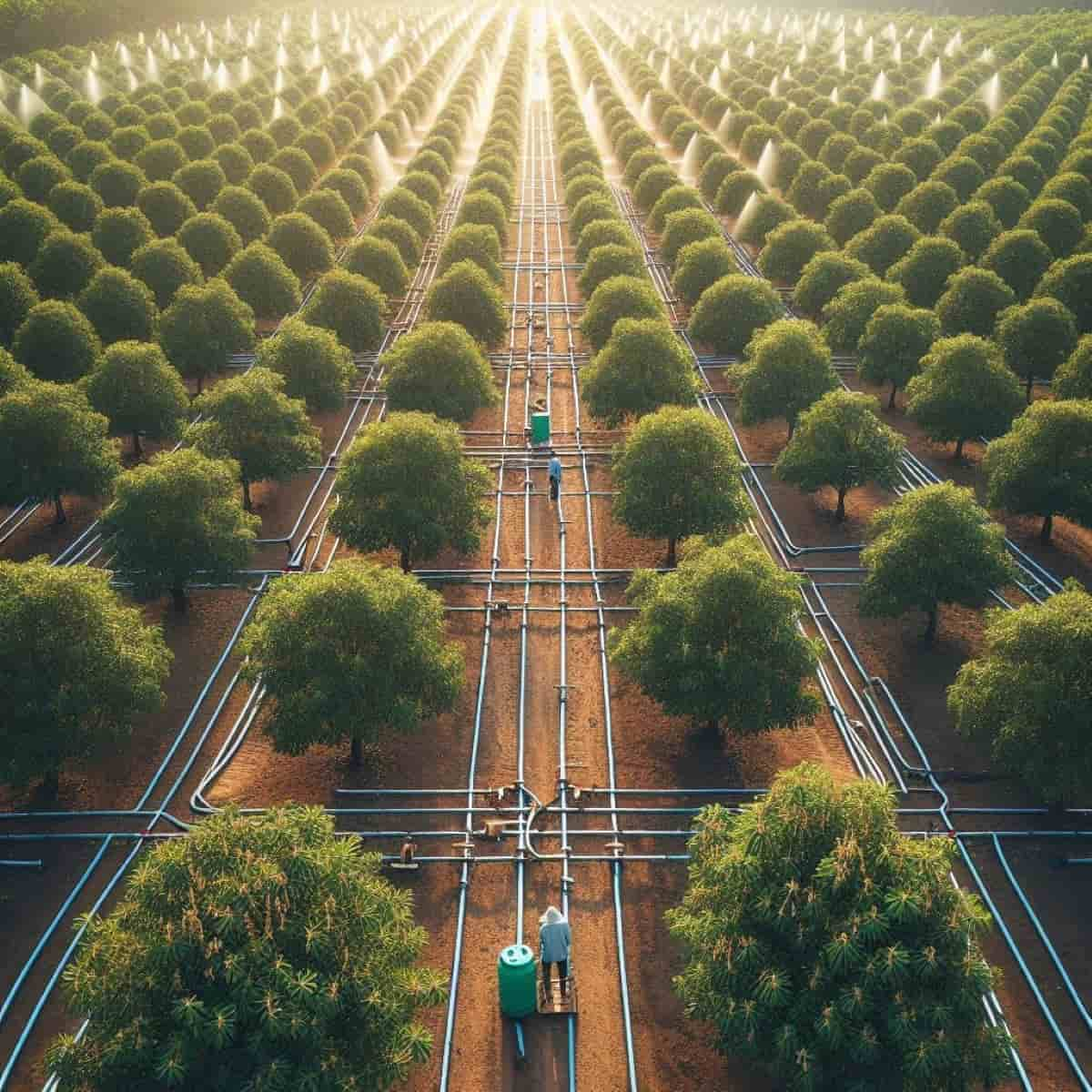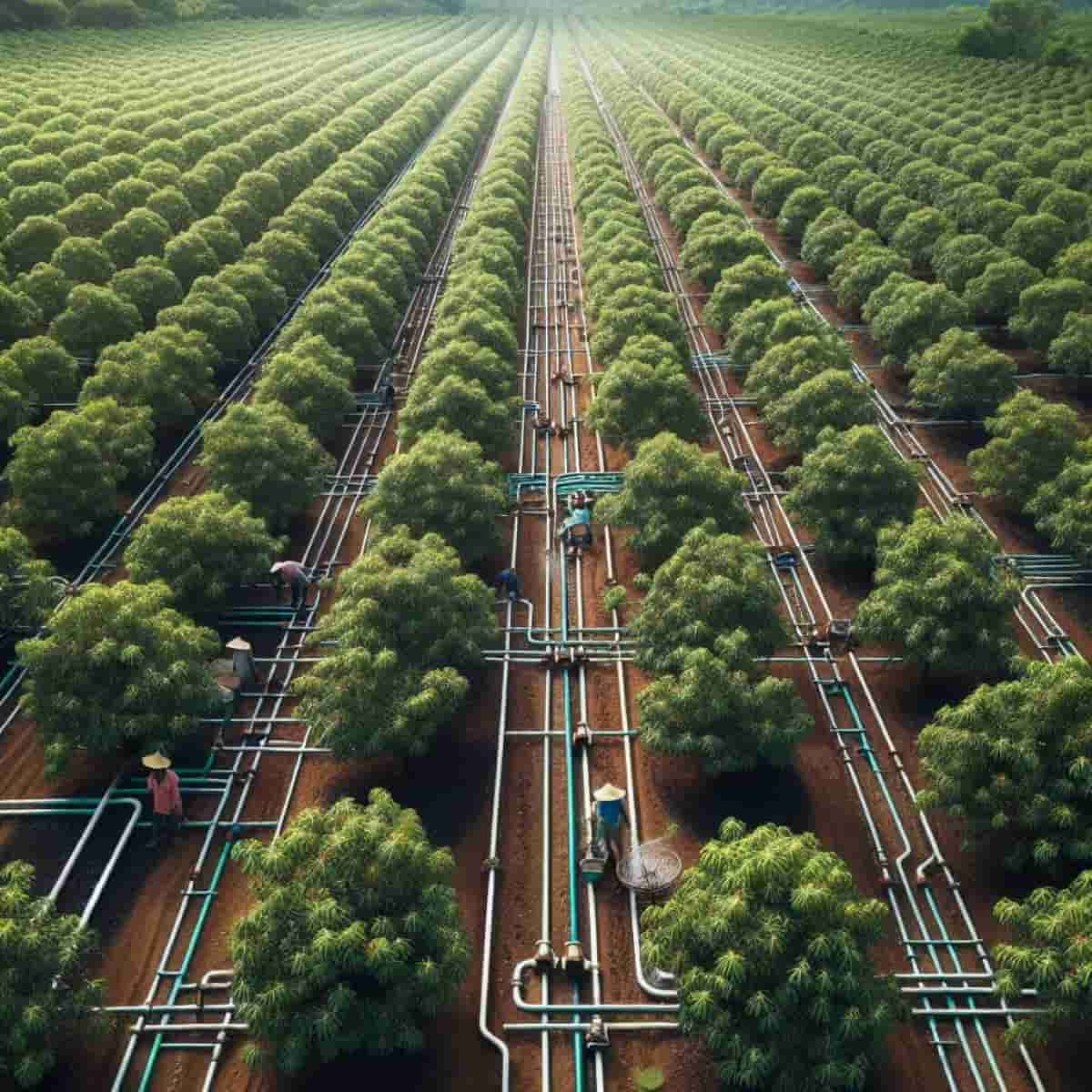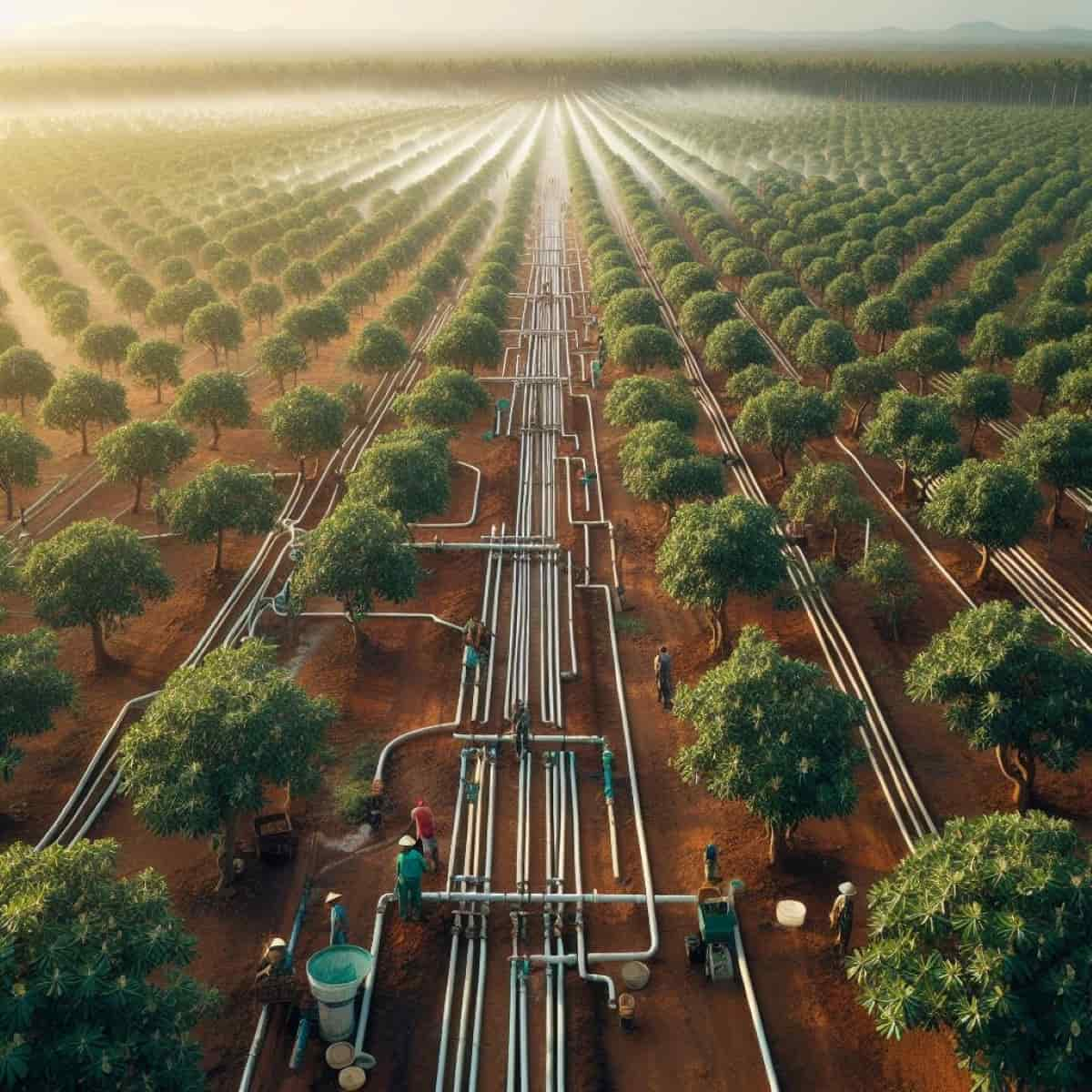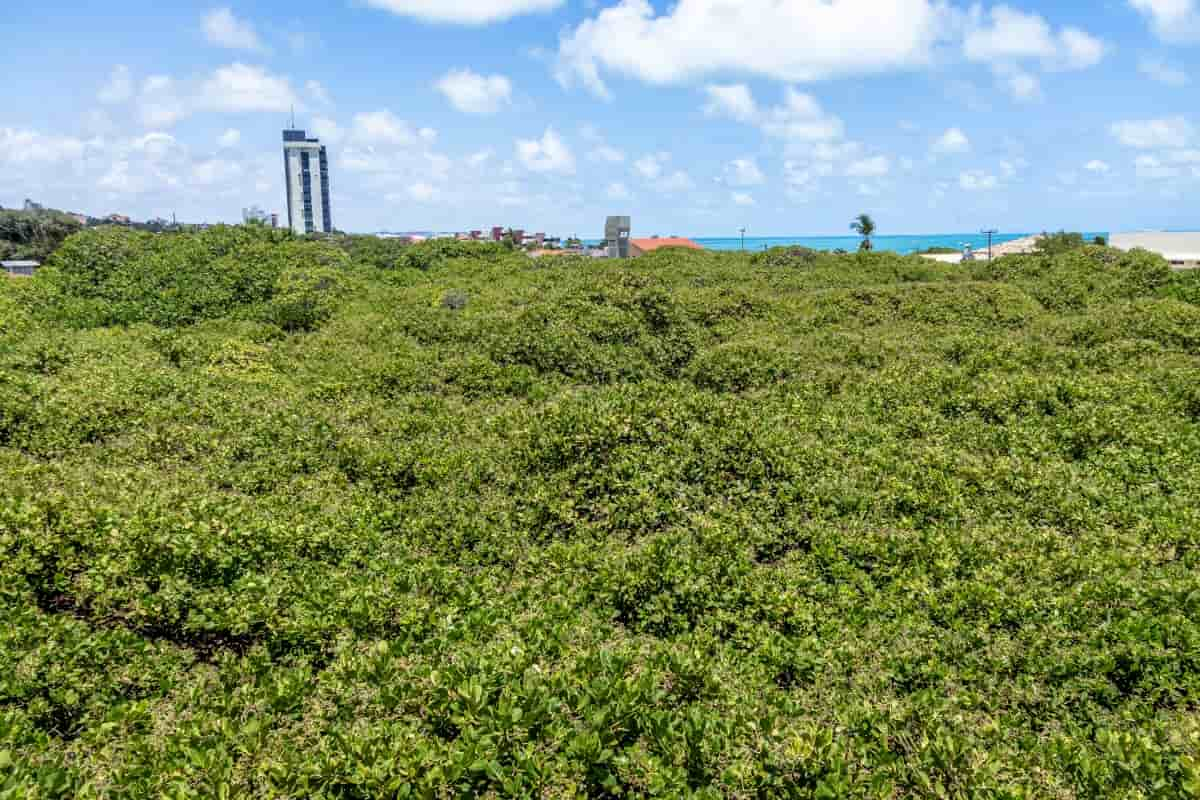Drip irrigation is a vital component in modern cashew plantations, ensuring efficient water use and improved crop yields. The initial investment for drip irrigation in a cashew plantation typically involves several factors. The cost per acre can vary based on factors such as the size of the plantation, type of drip system, and local labor and material costs.

On average, the initial investment for drip irrigation in cashew plantations ranges from Rs. 1,40,000 to Rs. 1,80,000 per acre. This investment covers the installation of drip lines, emitters, filters, pressure regulators, and other essential components.
Evaluate the Cost of Drip Lines and Emitters for Cashew Fields
Drip lines and emitters constitute a significant portion of the overall cost of a drip irrigation system in cashew fields. The cost varies based on factors like the type and quality of materials used. High-quality drip lines and emitters ensure uniform water distribution, promoting optimal growth conditions for cashew trees.
On average, the cost of drip lines and emitters can range from Rs. 15,000 to Rs. 20,000 per acre. Cashew plantation owners must select durable and efficient drip lines and emitters to maximize the benefits of the irrigation system and ensure a long-term return on investment.
Analyze the Expense of Filters and Pressure Regulators in Drip Irrigation Systems
Filters and pressure regulators are essential components of drip irrigation systems, playing a crucial role in maintaining the system’s efficiency and longevity. These component costs will vary based on factors such as the size of the plantation and the water quality in the region.
On average, the expense of filters and pressure regulators in drip irrigation systems for cashew plantations ranges from Rs. 10,000 to Rs. 15,000 per acre. Investing in high-quality filters and pressure regulators helps prevent clogging and ensures consistent water pressure, contributing to the overall success of the cashew crop.
Estimate the Cost of Automation and Control Systems in Drip Irrigation for Cashew
Automation and control systems are vital in enhancing the efficiency and precision of drip irrigation in cashew farming. These systems help optimize water distribution, monitor soil moisture levels, and schedule irrigation cycles based on the specific needs of cashew trees.
On average, the cost of automation and control systems in drip irrigation for cashew plantations ranges from Rs. 20,000 to Rs. 30,000 per acre. The potential water savings, improved crop health, and streamlined management of irrigation schedules justify the investment in these systems.
Assess the Price of Pumps and Pumping Stations for Drip Irrigation in Cashew Farming
The cost of pumps and pumping stations depends on factors such as the water source, required pumping capacity, and the distance the water needs to be transported. On average, the cost of pumps and pumping stations for drip irrigation in cashew farming ranges from Rs. 30,000 to Rs. 40,000 per acre. It’s important for farmers to carefully assess their water requirements and select pumps that match the specific needs of their cashew plantation.
In case you missed it: Cost of Drip Irrigation Per Acre for Pomegranate: Exploring Installation Costs Along with Subsidy

Explore the Cost of Fertilizer and Nutrient Injection Systems in Drip Irrigation for Cashew
Fertilizer and nutrient injection systems are crucial components in drip irrigation for cashew plantations, enabling precise delivery of essential nutrients directly to the root zones of cashew trees. The cost of these systems will vary based on factors such as the type and complexity of the injection equipment, the type of fertilizers used, and the size of the plantation.
On average, the cost of fertilizer and nutrient injection systems in drip irrigation for cashew plantations ranges from Rs. 20,000 to Rs. 30,000 per acre. The enhanced nutrient management justifies this investment, increased nutrient use efficiency, and improved overall health and productivity of cashew trees.
Calculate the Labor and Installation Costs for Drip Irrigation in Cashew Plantations
Labor and installation costs are significant components of the overall investment in drip irrigation for cashew plantations. These costs encompass the expenses associated with preparing the land and installing drip lines, emitters, filters, pumps, automation systems, and other necessary components.
On average, the labor and installation costs for drip irrigation in cashew plantations range from Rs. 25,000 to Rs. 30,000 per acre. The variation in costs depends on factors such as the topography of the land, the complexity of the irrigation system, and local labor rates. It’s essential to engage skilled labor for the installation process to ensure the proper working of the drip irrigation system and maximize its benefits.
Factor the Maintenance and Repair Expenses for Drip Irrigation Systems in Cashew Farming
On average, the annual maintenance expenses for drip irrigation systems in cashew farming range from Rs. 5,000 to Rs. 15,000 per acre. This estimate will vary based on factors such as the quality of components used, the local environment, and the frequency of required maintenance. Investing in high-quality filters and durable components can contribute to lower maintenance costs over time.
In addition to regular maintenance, it’s important to factor in potential repair expenses. While the frequency of major repairs can vary, setting aside an annual budget for unexpected maintenance is advisable. On average, the annual repair expenses for drip irrigation systems in cashew farming range from Rs. 10,000 to Rs. 15,000 per acre.
Energy Costs Associated with Drip Irrigation in Cashew Cultivation
Drip irrigation systems may require energy for running pumps, automation and control systems, and other components. The energy consumption can vary based on the size of the plantation, the type and efficiency of the irrigation equipment, and the local electricity rates. On average, the energy costs for drip irrigation in cashew cultivation range from Rs. 8,000 to Rs. 15,000 per acre annually.
In case you missed it: Cost of Drip Irrigation Per Acre for Sapota: Exploring Installation Costs Along with Subsidy for Sapodilla

Table for Cost of Drip Irrigation Per Acre for Cashew Plantation
| Item | Cost Range (INR) |
| Drip Lines & Emitters | 15,000-20,000 |
| Filters and Pressure Regulators | 10,000-15,000 |
| Automation and Control Systems | 20,000-30,000 |
| Pumps and Pumping Stations | 30,000-40,000 |
| Fertilizer and Nutrient Injection Systems | 20,000-30,000 |
| Labor and Installation Costs | 25,000-30,000 |
| Maintenance and Repair Expenses | 15,000-30,000 |
| Energy Costs | 8,000-15,000 |
Government Subsidy for Drip Irrigation in Cashew Plantations
PMKSY (Pradhan Mantri Krishi Sinchayee Yojana) was launched on 1st July 2015 with the objective of achieving convergence of investments in irrigation. PMKSY (Per Drop More Crop) – Focuses on enhancing water use efficiency at the farms through drip and Sprinkler irrigation systems.
The pattern of financial assistance payable to the farmers under the micro irrigation scheme will be 55% for small and marginal farmers, whereas it is 45% for other farmers. Both the central government and state government will meet at a ratio of 60:40 for all states except the North Eastern and Himalayan states. For these two states, the ratio of sharing is 90:10. For the Union Territories, the funding pattern is 100% granted by the Central Government.
Compare the Overall Operational Costs of Drip Irrigation vs. Traditional Methods in Cashew Farming
Labor Costs: Drip irrigation systems, once installed, can be more efficient in water distribution, reducing the need for manual labor in comparison to traditional methods like flood irrigation. Labor costs for maintenance and monitoring, however, should be considered.
Water Usage: Drip irrigation is known for its water efficiency, delivering water directly to the root zone. This can result in lower water usage compared to traditional methods, especially in regions facing water scarcity.
Maintenance Costs: Drip irrigation systems require ongoing maintenance, but the costs are generally lower than those associated with traditional methods like furrow or flood irrigation. Regular checks on filters, emitters, and pumps contribute to system longevity.
Operational Efficiency: Drip irrigation allows for precise control over water and nutrient delivery, promoting optimal conditions for cashew trees. This enhanced efficiency can lead to improved crop yields and, consequently, increased revenue.
In case you missed it: Cost of Drip Irrigation Per Acre for Teak Plantation: Exploring Installation Costs along with Subsidy

Conclusion
In conclusion, while the initial investment involves expenses for installation, components, and automation, exploring available subsidies can significantly alleviate financial burdens. The long-term benefits, including water efficiency and improved yields, make drip irrigation a sustainable and economically viable choice for cashew farmers, contributing to the overall success of their plantations.
- Feed Your Flock for Less: Top 10 Tips to Save on Chicken Feed
- Ultimate Guide to Ossabaw Island Hog: Breeding, Raising, Diet, and Care
- Hatching Answers: The Top 10 Reasons Your Chickens Aren’t Laying Eggs
- Eggs and Economics: Breaking Down the Cost of Raising Backyard Chickens
- Defend Your Greens: Proven Methods to Keep Iguanas Out of Your Garden
- Ultimate Guide to Cinnamon Queen Chicken: A Comprehensive Guide for Beginners
- Ultimate Guide to California Tan Chicken: Breeding, Raising, Diet, Egg-Production and Care
- Ultimate Guide to Marsh Daisy Chicken: Breeding, Raising, Diet, and Care
- 10 Types of Chicken Farming Businesses You Can Start for Profits